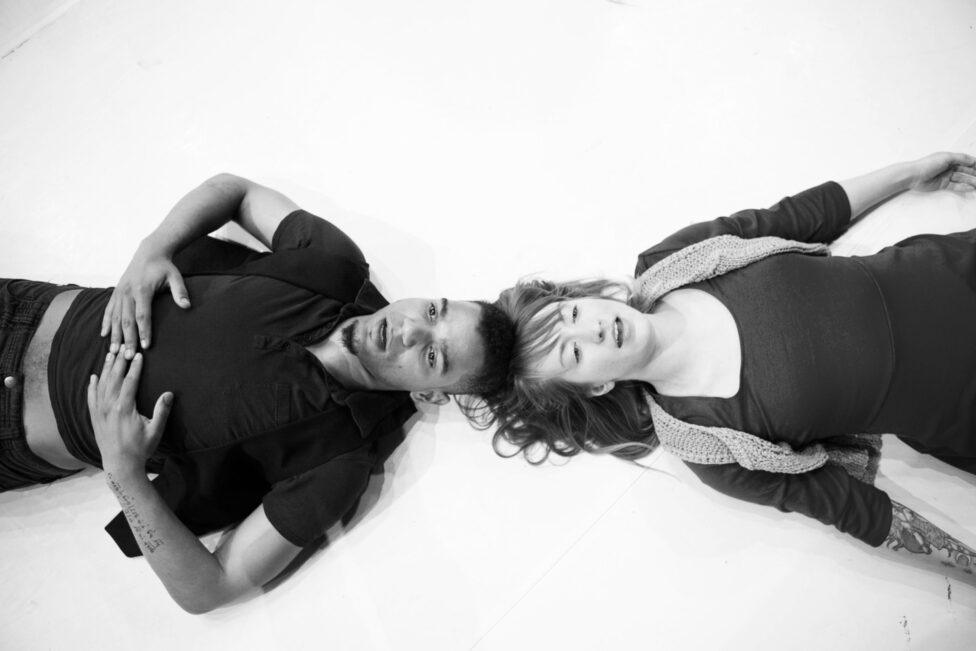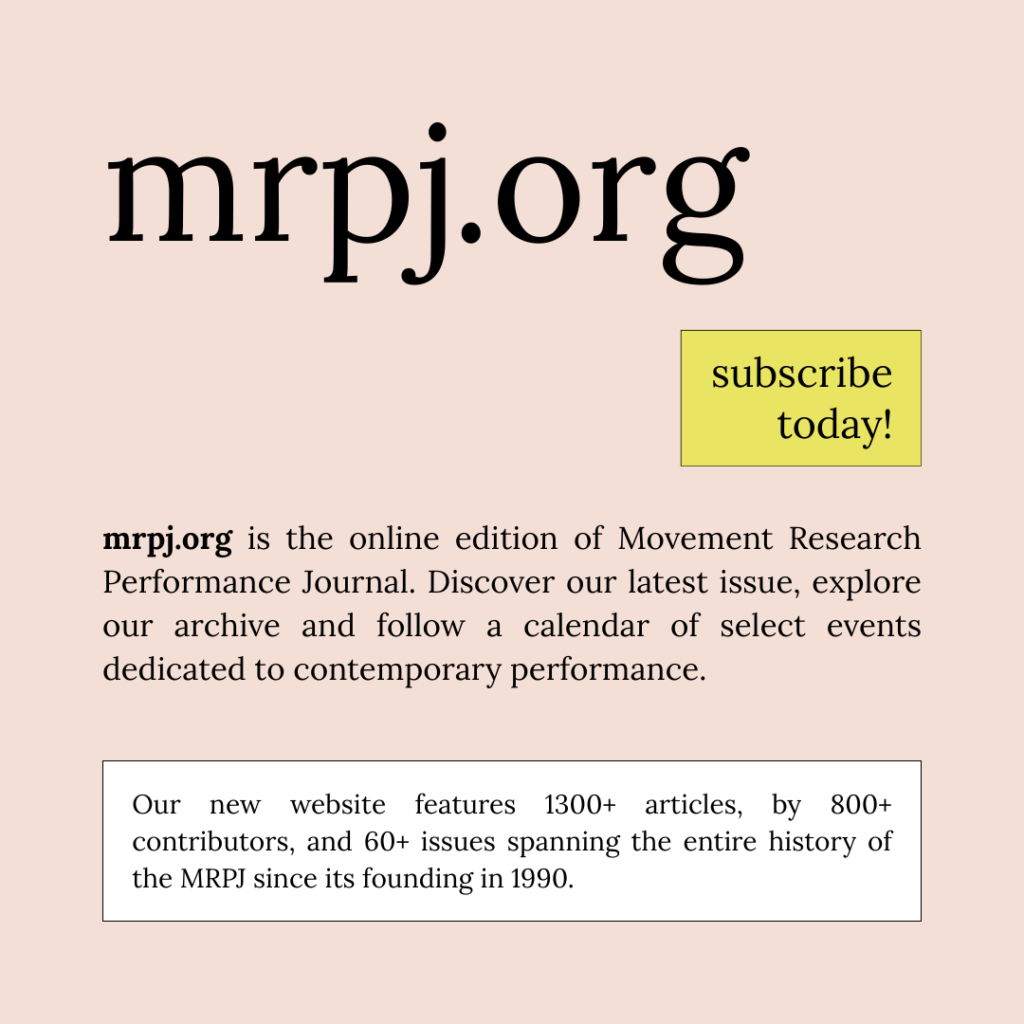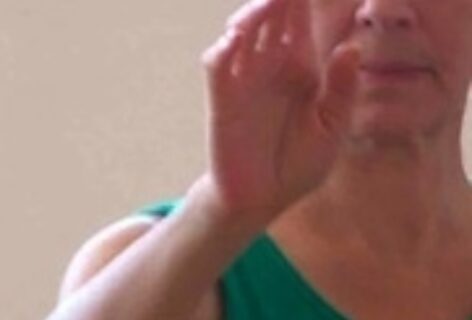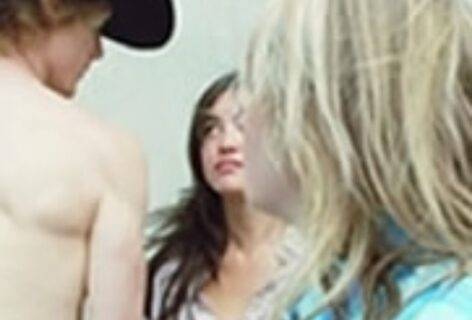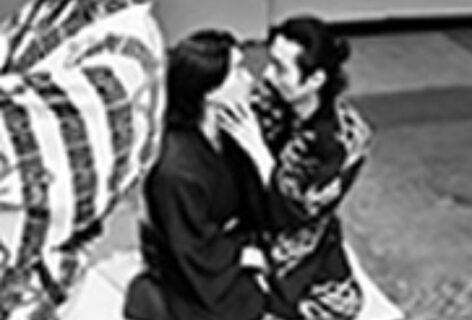Marissa Perel: How was the Commons Choir conceived?
Daria Faïn: It happened in 2008. Robert and I made an installation in the vault of the J.P. Morgan building downtown, a dark room, the base of J.P. Morgan, which we called the “Perineum of Wall Street.”
MP: A deep, dark place! [laughter]
DF: Robert and I did a lot of research on darkness, how it affects the body and how it affects language. We bridged a healing practice with a poetic practice in the dark. That’s where the choir began; we like to say that the choir was incepted in the perineum!
Robert built a beautiful installation that held 8 people at a time. So we had 8 people in the dark, making sounds, and we were just experimenting. It was there that we started to work with phonemes. We had a phrase that Robert found from Rudolf Steiner, that if all the phonemes of the universe could be sung together, we will create another universe. So we were all in the dark and making these sounds, and that was the beginning of the choir.
Robert Kocik: Speech sounds are part of a cosmogenesis. Our body formed around these sounds to say them. In English there are 40 to 45 sounds to our speech. In the J.P. Morgan building we started with a score, “all at once,” which was for everyone to make all of these sounds at once, which was like starting from the beginning of the cosmos. Then we had the “phonemic emanation,” where we reenacted the sequences of sounds that are the origin of speech, which ones came first, which ones after. It’s possible that this is the first time this kind of thing has been done in English. We also did a score called, “the garland of letters,” of specific phonemic sequences.
MP: What were the performers doing with their bodies while they were following the sound scores?
DF: In the beginning it was very open and experimental. We didn’t have an agenda besides listening to what was happening in our bodies. Then Robert came up with a concept called “braids” stemming from his Vedic studies. We started to really feel what each of the phonemes were doing in the body, and what processes were occurring inside us.
We were interested in the research of Hans Jenny, and Cymatic theory. There was a system of passing sand over vibrating brass, and the grains would settle in very clear patterns. This was done with water and petroleum as well. Dissonant vibrations would disrupt the patterning. We realized that this was probably what was happening in the body as well, so we started applying some of the Cymatic theoretical components to the body.
MP: I remember in your Qi-Gong class, you showed an exercise for purifying water in a glass with our Qi. You showed pictures of different pollutants getting cleared away by Qi. Does this relate to Cymatics when applied to physical movement?
DF: Yes, it is very connected. Frequency and vibration are everything that we are, do, and make. When you’re putting intention into that vibration, you are affecting your own cellular make-up, and you start consciously relating to the cellular make-up of others. We are literally creating ourselves through speech. We’ve tried applying empiric…how do you say it, “empyrique?”
RK: Yes, “empirical.”
DF: So we’ve tried applying empirical methods to prosody to understand all the possibilities for embodying these sounds.
RK: One of the rudimentary experiences we’re working with is how utterly susceptible we are to sound, to tone, to presence and intention. We literally form another when we meet. We configure each other. We didn’t want to call it “vibe.” I like “vibe,” but we settled on “prosody.” Prosody is composing with the material of which we’re made, but more importantly, the medium in which we relate to one another, this is prosody. It’s what we call “the prosodic body,” composing inter-relationship with sound, tone, gesture, and movement.
MP: So what does it mean to be making this performance with trained performers of one form or another? Do they need to step out of their training or area of expertise to step into this way of relating? What is the process of working with the group?
DF: Something with this form is that the more you practice it, the better you get at it, but it’s also very immediate. The moment you start with it, you start to change and notice things. Some of the people we’re working with have been here since the inception, and others are completely new. It’s very different than the way you’d work on a traditional production.
I didn’t choose the performers. Sometimes I asked a performer to participate, but others I would have never met otherwise. Everyone has a very different background and understanding of the work; it’s a very eclectic group! We’ve been working with everyone’s unique way of understanding, and at the same time trying to reach a greater understanding that is beyond our individual perceptions.
RK: A lot of these things are things we just do. They happen, and we aim to have them parallel these empirical approaches. When you’re able to tap into that level of awareness, you experience a healing awareness with these sounds. We’re working with a large group in production mode right now, but even this is oddly without a huge degree of pressure. We’re existing in a trust and atmosphere that we’ve been working with the whole time. The work should be beneficial; it has to be.
MP: How does the concept of the commons enter into the work? It’s political. So, there’s this organic, prosodic process and then another, perhaps allegorical purpose to the choir?
RK: The premise of the choir is that our current ecological and economic inequities and crises are a direct result of the sonic and connotative qualities of Super-power English. So, it’s influencing the globe, and we’re at the epicenter of it as native speakers, especially being in New York.
MP: You’re taking the meaning of the language away from the Superstructure by bringing it down to a phonemic level.
RK: Yes, and idiomatic, and “neo-creole,” reinvesting the language with qualities it never had. We did a careful study of the commons, and the history of privatization, of English as a carrier of oppression. Has English ever been a language of free people? Has this ever been the land of the free? The concept of the commons has been excluded from American conception of land. Virginia, for instance, was founded by the Virginia Company, which brought indentured workers over here to start making money for stockholders in London. The land was owned by the crown, then the company, then some of the workers who worked through their indentured terms bought land from the company. There was never a dialogue about ownership, or shared space. Territory was never open once the Europeans came. English has only ever been a commercial, mercenary, duplicitous language. America has broken every treaty it has ever made.

